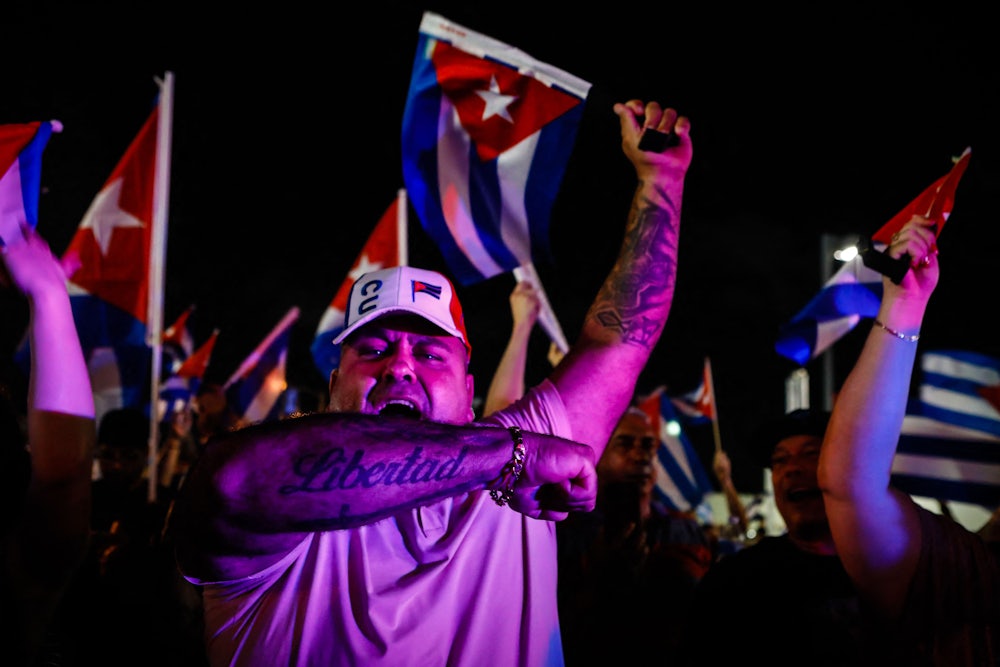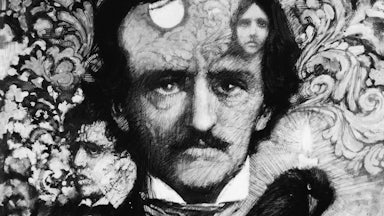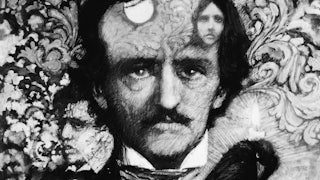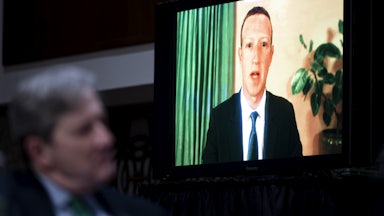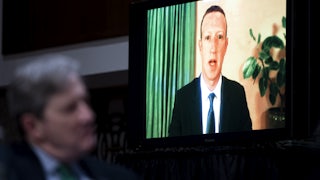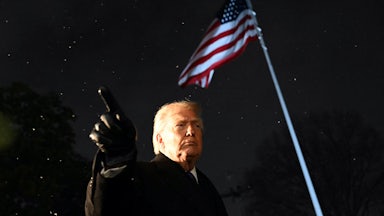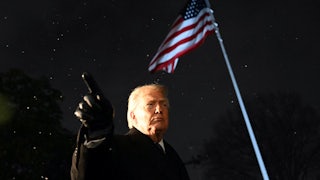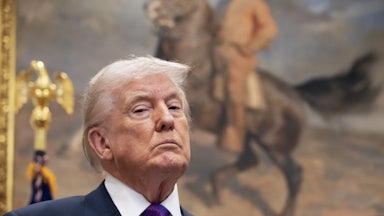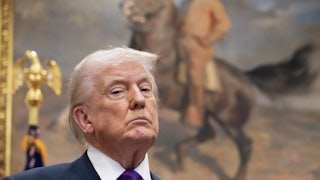When the protests against the Cuban government broke out across the island on July 11, one of President Miguel Díaz-Canel’s first reactions was to refer to the behavior of the protesters as “totalmente vulgar, indecente, delincuente” (completely vulgar, indecent, delinquent). Though he would later backpedal and take a conciliatory tone, this elitist dismissal of the people in the streets was telling. It points to the divisions within Cuba—specifically those related to class, race, and region—and the ways the government has for decades prioritized tourism over the needs of its citizens, driving forces of anti-government sentiment that the international media has largely overlooked.
The Spanish word vulgar also has racialized connotations of lowbrow culture and a lack of education—historically, it was used to denigrate Afro-Cuban cultural practices, like rumba. Díaz-Canel’s statement also echoed the terms used to refer to the “Marielitos”—the 125,000 Cubans who fled to the United States from the Cuban port of Mariel in 1980 after Fidel Castro decided, following protests, to allow Cubans to emigrate en masse. In addition to the term “gusanos” (worms), which is still used as an epithet to refer to Cuban exiles and dissidents, Castro referred to the Marielitos as “escoria” (scum). It seems doubtful he would have used such charged language if the Marielitos were not disproportionately made up of Black, mixed-race, and poor Cubans. Castro, in an admittedly brilliant tactical move, took advantage of the exodus by putting a few thousand convicted criminals and mentally ill people onto the boats, thus ridding himself of what he considered the “undesirables” of Cuban society.
But it’s not only the attitudes toward Marielitos that betray the ways the 62-year-old regime has not lived up to its projected ideals of egalitarianism. Since the introduction of foreign tourism in the 1990s, the island has seen a re-exacerbation of economic inequality that had been all but eliminated in the first three decades of the revolution. The fall of the Soviet Union (Cuba’s patron) in 1991 precipitated a massive economic crisis, and the national economy contracted by 40 percent. Referring to this crisis as the “special period,” Fidel Castro asked citizens to sacrifice so the socialist regime could survive—which meant near-starvation for many Cubans. And yet, the “revolutionary elites,” Cubans who hold important positions in the Communist Party, weren’t subject to the same deprivation.
Moreover, Cubans were relegated to second-class citizenship in the 1990s, via “tourism apartheid”—measures implemented to make European and Canadian tourists feel “safe,” like restricting Cubans’ access to hotels, beaches, and other tourist zones. These policies were also racist, as Black and mixed-race Cubans were turned away from lucrative tourism jobs; state-run agencies, citing the need for employees to be “presentable” and “educated,” assumed tourists would only be comfortable interacting with white Cubans. Black Cubans were also routinely detained on the streets of Havana, particularly when walking with white foreigners, as they were assumed to be “hustlers.” (I experienced this racial profiling firsthand a few times in the 2000s, while walking with the man who would become my husband.)
Racialized class differences have accelerated since the 1990s, as Cubans with relatives living abroad receive regular remittances, a phenomenon ushered in during the “special period,” when the dollar was legalized. This money is used not only for subsistence purposes but also to open private restaurants and casas particulares (bed and breakfasts), and engage in other types of private entrepreneurship, which was also legalized in a limited manner in the 1990s. Many of the Cubans who have been able to capitalize on their access to hard currency and ownership of large homes and cars are those in proximity to power on the island. It’s no wonder that they would be firmly committed to the political status quo and reject any demands for change. As former Cuban diplomat Enrique Guzmán Karell put it on his Facebook page, “This is why there aren’t any protests in [the wealthier Havana neighborhoods] of Vedado, Miramar and Siboney.”
Access to remittances is both racialized—the majority of Cubans living abroad and their family members on the island are white—and regionalized, as they go mostly to Havana residents. What this means in practice is that Black Cubans and those outside of Havana tend not to have relatives living abroad to soften the blow of the current economic crisis, including the horrific rates of inflation that have made basic food and hygiene products inaccessible.
These protests also highlight the regional inequalities within Cuba. Instead of kicking off in the capital, historically the site of greater anti-government sentiment on the island, these protests began in smaller municipalities, like San Antonio de Los Baños, outside of Havana, and Palma Soriano, near the eastern Cuban city of Santiago. Support for the Cuban government is generally much higher in the “provinces” (outside Havana). Santiago’s nickname is the “cradle of the revolution”; it’s where Castro built his guerrilla movement that eventually toppled the Batista dictatorship. In these places dissidents keep a much lower profile, knowing their activity and words could easily be reported by neighbors to local intelligence officials.
But the provinces are also the places that bear the brunt of the economic crisis in Cuba. The variety and quality of food, medicine, and basic supplies is much lower outside Havana. The apagones (blackouts) are longer and more frequent—which is particularly unbearable during the extremely hot summer months. It is these regional inequalities within Cuba that led people in the provinces to rise up.
The government appears to have decided that Cubans living abroad should prop up the stagnant national economy by sending remittances to their relatives (as well as paying exorbitant fees on passport extensions and import taxes on the items they bring into the country when visiting). As Cuban historian Abel Sierra Madero wrote on Twitter in Spanish this week: “My parents were militant communists, they gave everything for the Revolution. Now they have a shitty pension that doesn’t provide them even enough to eat. From a distance [i.e., the U.S. and with my remittances], I make sure they have a dignified life in old age. I’m the Minister of Social Welfare, not the Cuban state.” But what do Cubans with no help from abroad do?
It is likely that among the protesters were these most desperate Cubans, who have no other recourse. They weren’t protesting the U.S. embargo (which is not to say it doesn’t play a decisive role in the long-term stagnation of the Cuban economy). Many were shouting “libertad!” But that shouldn’t only be understood as freedom from socialism, as many of these protesters are not necessarily political dissidents.
Cuban protesters are demanding freedom from economic deprivation and freedom from a manipulative government that insists it is broke due to the U.S. embargo and can’t provide the population with basic food products—but then, after days of protests, suddenly restocks the stores with oil and chicken in Santiago. (Magically, the blackouts have also ceased.) The government also had enough resources to build new tourist hotels during the pandemic despite severely diminished tourism coming in, and, as dissident blogger Yoani Sánchez noted, the public transportation that’s usually so scarce in Havana was able to bring “revolutionaries” to the government-led rally on Saturday. For 60 years, Cuba’s revolutionary elite has asked the populace to make sacrifices “for the greater good” while making none of its own. Now those Cubans have had enough.
